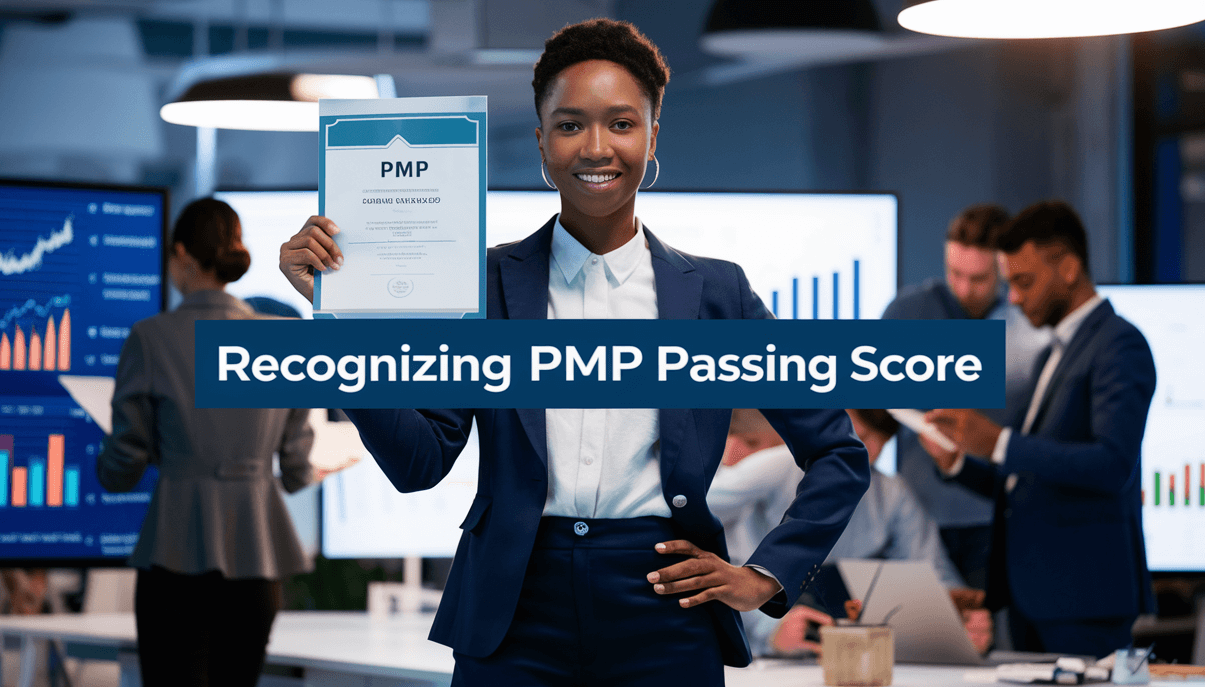Becoming a certified PMP Professional is not a walk in the park and as we all know it can be an exhilarating endeavor. On the other hand, as a globally recognized credential it is not just a feather in your cap but it is a benchmark of excellence in project management. Amidst the excitement of pursuing this prestigious credential lies a query that sometimes makes us curious and anxious: What is PMP passing score and how is it determined?
Much like peeling an onion, uncovering PMP’s passing criteria requires layers of intrigue. It’s not like hitting a fixed mark by applying project management principles. Therefore, in this blog, we will demystify PMP ‘s passing score, the nuances of how it is evaluated, and how proper preparation can help you conquer this challenging exam.

Jump ahead to
PMP Exam: Setting the Stage for Excellence
This PMP Exam is developed and administered by the Project Management Institute and is a rigorous evaluation testing one’s capability to apply project management conventions in actual contexts. The exam consists of 180 questions that spread across domains such as people, process, and business environment. The lion’s share of this exam’s questions revolves around people and process. It is crafted to assess your competence across the dimensions using multiple choice, drag and drop, and hotspot questions. Additionally, PMI ensures that the exam incorporates Agile, hybrid, and traditional methodologies. Therefore, the dynamic nature of this exam makes grasping its passing criteria more critical for aspiring PMPs.
How is the PMP Exam Score Determined?
What stands out here is that, unlike other conventional exams with a fixed passing percentage, PMP Exam employs a psychometric model to determine the passing scores. This model ensures that all candidates face a balanced level of challenge by adjusting the difficulties of questions.
Here’s how it works:
- No Fixed Percentage
PMP does not disclose a specific percentage or score required to pass. This pushes candidates to aim for a comprehensive preparation rather than targeting a particular number to achieve.
- Scaled Scoring System
Here your performance is scrutinized on a proficiency level. That is above target, below target, or needs improvement. These levels showcase the proficiency of the candidate in the respective domains of PMP Exam.
- Equating the Process
PMI uses statistical analysis to make the exam fair to all. This means, the difficulty of the exam is calibrated, and if it contains slightly harder questions for a significant number of candidates the scoring adjusts to maintain equity. It would suggest that the question is ambiguous or in need of refinement for further quality.
This dynamic scoring ensures that every candidate is evaluated fairly. In short, the candidates of the exam will be given a score report without revealing the exact scores yet they can know their performance in each domain. This aids them to prepare tactically for the exam by stressing the areas of improvement.
What drives PMP Exam Pass Rates?
Undoubtedly we can say that the PMP Exam is no cakewalk. Its pass rates hinge on several pivotal factors. First, the depth of preparation plays a starring role. This indicates that candidates with a strong grasp of PMI’s Exam Content Outline and consistent practice are more likely to succeed. Next, it’s the quality of training. Opting for reputable training providers can ensure comprehensive guidance. It’s crucial to emphasize the relevance of mock exams in preparation. If you practice thoroughly with mock exams it will be reflected in the actual exam as better time management skills and confidence. Finally, exam day strategies like pacing and interpreting questions can make or break the outcome.
Mastering PMP Exam: A Strategic Approach to Domains and Pass Rates
Understanding the exam pattern and pass rates is vital for crafting a winning strategy to truly prevail in PMP Exam. The multiple choice questions of the exam are designed to challenge your project management acumen. These questions span five key domains such as initiating, planning, executing, monitoring, controlling, and closing. While all these domains hold equal weight in terms of importance, their pass rates vary. Often, this is due to the complexity of the topics or the candidate’s expertise in those areas.
In fact, a smart study strategy hinges on knowing which domains carry heavier loads or have historically posed more challenges. By concentrating on areas with higher stakes while revisiting simpler domains candidates can finetune their preparation for a holistic understanding.
To acquire a solid knowledge of the pass rates, Psychometric analysis, a statistical method is used to analyze exam patterns. This unwraps the patterns in a candidate’s performance and offers insights across various domains. It also includes comparing the scores of people who are PMP certified and analyzing their scores within each area.
In short, neglecting any domain is a misstep. Finding a balance between high-risk areas, and shoring up your knowledge across all topics will set you up for exam success.
Preparation is the Key to Victory
Knowing the above key factors that influence PMP Exam pass rates you’re likely fired up to prepare and ace the exam. Conquering the PMP Exam begins with adopting a disciplined preparation strategy. Here is a roadmap to ensure success:
- Understand the exam content outline
Diving deep into the PMI’s Exam Content Outline is critical before sitting for this exam. This document is a treasure trove of information that outlines the key domains and tasks you will be tested on.
- Leverage training resources
Enrolling in training sessions with reputed programs is predominant. Look for programs that include real-world case studies, interactive sessions, and hands-on exercises.
- Creating a study schedule
For any exam, consistency is the cornerstone for success. Dedicating regular study hours, and revisiting concepts are tactical moves. You can use visual aids like mind maps, flashcards, and summary notes to enhance the information retention power.
- Stay updated with Agile
Take special notice of Agile methodologies. That means always emphasizing Agile practices and concepts in your exam preparation, especially for people and process domains.
- Dive into the PMBOK Guide
One of the essentials of PMP Exam preparation is utilizing the PMBOK Guide. You can use it as a primary study reference for understanding project management processes, tools, and techniques.
- Using PMP Exam Preparation books
Investing in high-quality books can also be added to your exam preparation master plan. It can assist you with deeper explanations and practice questions to reach a competent PMI Passing Score.
- Joining study groups
Another exam readiness tip is to participate in online forums or local study groups to gain different perspectives and swap success tips.
- Capitalizing on PMP Mobile Apps
Make the most of mobile apps for on-the-go practice which reinforces the imperative concepts and can be used to test your knowledge at any time.
Three Important Points to Remember Before Taking PMP Exam
Some points should be considered before attempting the exam as suggested by PMI:
- Keep up with the latest PMP Exam blueprint: As PMI always updates the exam content outline, all participants need to ensure that they are reviewing the most current version and are aligned with the latest exam focus and requirements.
- Verify Your Eligibility– Take special notice of the eligibility criteria instructed by PMI and make sure that you meet all the eligibility requirements including the required educational background and project management experience ( For instance, PMI might suggest that the candidates must have a minimum number of hours leading a project)
- Understanding the Exam Fees and Retake Policy– Familiarizing with cost breakdown and retake rules can help you to plan financially and emotionally for the process.
The Role of Reliable Training in PMP Success
No discussion about PMP success is complete without highlighting the vital role of dependable PMP Certification Training. With training, PMP Exam aspirants may get a structured learning path meticulously mapped to PMI’s PMP Exam Content. This can ensure that the knowledge obtained is in a logical sequence that avoids any confusion down the road. Furthermore, mock exams and simulations are secret sauces that recreate the actual exam experience. This helps them to navigate through the time pressure and question format of the real PMP Exam. In addition, certified trainers offer expert guidance to turn theoretical knowledge into real-time applications. With well-crafted resources like study guides, case studies, and video tutorials individuals can transform their exam preparation to tangible success.
A candidate can initiate their learning journey with other foundational courses on Project Management including Introduction to Project Management, PMI Project Management Ready Training, and PMI Scheduling Professional Training.
In Conclusion
PMP passing score may remain a mystery cloaked in the psychometric wizardry. Nevertheless, it enhances the determination, fairness, accuracy, and relevance of the PMP Exam. For professionals, it underscores the influence of holistic preparation and Project Management Professional Certification Training. The road to PMP Certification is exacting yet rewarding. The right training, structured approach, and unwavering determination can aid an individual not only to ace this exam but also to excel as a leader in the zestful sphere of Project Management.
So gear up, and embrace the challenge. Let PMP Certification be the stepping stone to your career’s zenith.
FAQs
What is PMP?
PMP stands for Project Management Professional. It is the most popular credential in project management that is universally approved and is offered by the Project Management Institute. This validates the expertise of a professional in managing projects across various industries.
What are the eligibility criteria to acquire PMP Certification?
There are certain criteria one should satisfy to obtain this valuable certification and those include:
- Criteria 1:- A four-year degree + 36 months of Project Management Experience+35 hours of formal project management training.
- Criteria 2:- A high school diploma +60 months of experience in Project Management +35 hours of Project Management Training.
How to apply for PMP Exam?
If you meet all the requirements set by PMI to sit for the exam, then you can directly go to pmi.org which is the official website, and apply. The application will be approved within a week.
Who should pursue PMP Certification?
Any professional in the project management arena or aspiring leaders who aim to boost their credibility, skills, and career prospects can take this certification.
Where can I take PMP Exam?
A candidate can attend this examination through approved Pearson VUE Testing Centers. PMI is also offering an online proctored PMP Certification Exam.
What is the passing score of PMP Exam?
The passing score of the PMP Exam is not disclosed. PMI uses psychometric analysis to determine the success of candidates based on the difficulty level of questions.
How often is PMP Exam updated?
PMI updates the exam content, structure, and delivery options regularly to reflect evolving industrial trends and best practices. This has a motive to remain relevant and aligned with the current Project Management standards.



